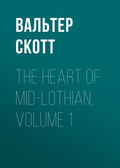
Вальтер Скотт
Waverley Novels — Volume 12
CHAPTER THE THIRTY-FIRST
To-morrow — oh, that's sudden! Spare him, spare him!
He's not prepared to die.
SHAKSPEARE.
At the moment when Achilles Tatius, with a feeling of much insecurity, awaited the unwinding of the perilous skein of state politics, a private council of the Imperial family was held in the hall termed the Temple of the Muses, repeatedly distinguished as the apartment in which the Princess Anna Comnena was wont to make her evening recitations to those who were permitted the honour of hearing prelections of her history. The council consisted of the Empress Irene, the Princess herself, and the Emperor, with the Patriarch of the Greek Church, as a sort of mediator between a course of severity and a dangerous degree of lenity.
"Tell not me, Irene," said the Emperor, "of the fine things attached to the praise of mercy. Here have I sacrificed my just revenge over my rival Ursel, and what good do I obtain by it? Why, the old obstinate man, instead of being tractable, and sensible of the generosity which has spared his life and eyes, can be with difficulty brought to exert himself in favour of the Prince to whom he owes them. I used to think that eyesight and the breath of life were things which one would preserve at any sacrifice; but, on the contrary, I now believe men value them like mere toys. Talk not to me, therefore, of the gratitude to be excited by saving this ungrateful cub; and believe me, girl," turning to Anna, "that not only will all my subjects, should I follow your advice, laugh at me for sparing a man so predetermined to work my ruin, but even thou thyself wilt be the first to upbraid me with the foolish kindness thou art now so anxious to extort from me."
"Your Imperial pleasure, then," said the Patriarch, "is fixed that your unfortunate son-in-law shall suffer death for his accession to this conspiracy, deluded by that heathen villain Agelastes, and the traitorous Achilles Tatius?"
"Such is my purpose," said the Emperor; "and in evidence that I mean not again to pass over a sentence of this kind with a seeming execution only, as in the case of Ursel, this ungrateful traitor of ours shall be led from the top of the staircase, or ladder of Acheron, as it is called, through the large chamber named the Hall of Judgment, at the upper end of which are arranged the apparatus for execution, by which I swear" —
"Swear not at all!" said the Patriarch; "I forbid thee, in the name of that Heaven whose voice (though unworthy) speaks in my person, to quench the smoking flax, or destroy the slight hope which there may remain, that you may finally be persuaded to alter your purpose respecting your misguided son-in-law, within the space allotted to him to sue for your mercy. Remember, I pray you, the remorse of Constantine."
"What means your reverence?" said Irene.
"A trifle," replied the Emperor, "not worthy being quoted from such a mouth as the Patriarch's, being, as it probably is, a relic of paganism."
"What is it?" exclaimed the females anxiously, in the hope of hearing something which might strengthen their side of the argument, and something moved, perhaps, by curiosity, a motive which seldom slumbers in a female bosom, even when the stronger passions are in arms.
"The Patriarch will tell you," answered Alexius, "since you must needs know; though I promise you, you will not receive any assistance in your argument from a silly legendary tale."
"Hear it, however," said the Patriarch; "for though it is a tale of the olden time, and sometimes supposed to refer to the period when heathenism predominated, it is no less true, that it was a vow made and registered in the chancery of the rightful Deity, by an Emperor of Greece."
"What I am now to relate to you," continued he, "is, in truth, a tale not only of a Christian Emperor, but of him who made the whole empire Christian; and of that very Constantine, who was also the first who declared Constantinople to be the metropolis of the empire. This hero, remarkable alike for his zeal for religion and for his warlike achievements, was crowned by Heaven with repeated victory, and with all manner of blessings, save that unity in his family which wise men are most ambitious to possess. Not only was the blessing of concord among brethren denied to the family of this triumphant Emperor, but a deserving son of mature age, who had been supposed to aspire to share the throne with his father, was suddenly, and at midnight, called upon to enter his defence against a capital charge of treason. You will readily excuse my referring to the arts by which the son was rendered guilty in the eyes of the father. Be it enough to say, that the unfortunate young man fell a victim to the guilt of his step-mother, Fausta, and that he disdained to exculpate himself from a charge so gross and so erroneous. It is said, that the anger of the Emperor was kept up against his son by the sycophants who called upon Constantine to observe that the culprit disdained even to supplicate for mercy, or vindicate his innocence from so foul a charge.
"But the death-blow had no sooner struck the innocent youth, than his father obtained proof of the rashness with which he had acted. He had at this period been engaged in constructing the subterranean parts of the Blacquernal palace, which his remorse appointed to contain a record of his paternal grief and contrition. At the upper part of the staircase, called the Pit of Acheron, he caused to be constructed a large chamber, still called the Hall of Judgment, for the purpose of execution. A passage through an archway in the upper wall leads from the hall to the place of misery, where the axe, or other engine, is disposed for the execution of state prisoners of consequence. Over this archway was placed a species of marble altar, surmounted by an image of the unfortunate Crispus — the materials were gold, and it bore the memorable inscription, TO MY SON, WHOM I RASHLY CONDEMNED, AND TOO HASTILY EXECUTED. When constructing this passage, Constantine made a vow, that he himself and his posterity, being reigning Emperors, would stand beside the statue of Crispus, at the time when any individual of their family should be led to execution, and before they suffered him to pass from the Hall of Judgment to the Chamber of Death, that they should themselves be personally convinced of the truth of the charge under which he suffered.
"Time rolled on — the memory of Constantine was remembered almost like that of a saint, and the respect paid to it threw into shadow the anecdote of his son's death. The exigencies of the state rendered it difficult to keep so large a sum in specie invested in a statue, which called to mind the unpleasant failings of so great a man. Your Imperial Highness's predecessors applied the metal which formed the statue to support the Turkish wars; and the remorse and penance of Constantine died away in an obscure tradition of the Church or of the palace. Still, however, unless your Imperial Majesty has strong reasons to the contrary, I shall give it as my opinion, that you will hardly achieve what is due to the memory of the greatest of your predecessors, unless you give this unfortunate criminal, being so near a relation of your own, an opportunity of pleading his cause before passing by the altar of refuge; being the name which is commonly given to the monument of the unfortunate Crispus, son of Constantine, although now deprived both of the golden letters which composed the inscription, and the golden image which represented the royal sufferer."
A mournful strain of music was now heard to ascend the stair so often mentioned.
"If I must hear the Caesar Nicephorus Briennius, ere he pass the altar of refuge, there must be no loss of time," said the Emperor; "for these melancholy sounds announce that he has already approached the Hall of Judgment."
Both the Imperial ladies began instantly, with the utmost earnestness, to deprecate the execution of the Caesar's doom, and to conjure Alexius, as he hoped for quiet in his household, and the everlasting gratitude of his wife and daughter, that he would listen to their entreaties in behalf of an unfortunate man, who had been seduced into guilt, but not from his heart.
"I will at least see him," said the Emperor, "and the holy vow of Constantine shall be in the present instance strictly observed. But remember, you foolish women, that the state of Crispus and the present Caesar, is as different as guilt from innocence, and that their fates, therefore, may be justly decided upon opposite principles, and with opposite results. But I will confront this criminal; and you, Patriarch, may be present to render what help is in your power to a dying man; for you, the wife and mother of the traitor, you will, methinks, do well to retire to the church, and pray God for the soul of the deceased, rather than disturb his last moments with unavailing lamentations."
"Alexius," said the Empress Irene, "I beseech you to be contented; be assured that we will not leave you in this dogged humour of blood-shedding, lest you make such materials for history as are fitter for the time of Nero than of Constantine."
The Emperor, without reply, led the way into the Hall of Judgment, where a much stronger light than usual was already shining up the stair of Acheron, from which were heard to sound, by sullen and intermitted fits, the penitential psalms which the Greek Church has appointed to be sung at executions. Twenty mute slaves, the pale colour of whose turbans gave a ghastly look to the withered cast of their features, and the glaring whiteness of their eyeballs, ascended two by two, as it were from the bowels of the earth, each of them bearing in one hand a naked sabre, and in the other a lighted torch. After these came the unfortunate Nicephorus; his looks were those of a man half-dead from the terror of immediate dissolution, and what he possessed of remaining attention, was turned successively to two black-stoled monks, who were anxiously repeating religious passages to him alternately from the Greek scripture, and the form of devotion adopted by the court of Constantinople. The Caesar's dress also corresponded to his mournful fortunes: His legs and arms were bare, and a simple white tunic, the neck of which was already open, showed that ho had assumed the garments which were to serve his last turn. A tall muscular Nubian slave, who considered himself obviously as the principal person in the procession, bore on his shoulder a large heavy headsman's axe, and, like a demon waiting on a sorcerer, stalked step for step after his victim. The rear of the procession was closed by a band of four priests, each of whom chanted from time to time the devotional psalm which was thundered forth on the occasion; and another of slaves, armed with bows and quivers, and with lances, to resist any attempt at rescue, if such should be offered.
It would have required a harder heart than that of the unlucky princess to have resisted this gloomy apparatus of fear and sorrow, surrounding, at the same time directed against, a beloved object, the lover of her youth, and the husband of her bosom, within a few minutes of the termination of his mortal career.
As the mournful train approached towards the altar of refuge, half-encircled as it now was by the two great and expanded arms which projected from the wall, the Emperor, who stood directly in the passage, threw upon the flame of the altar some chips of aromatic wood, steeped in spirit of wine, which, leaping at once into a blaze, illuminated the doleful procession, the figure of the principal culprit, and the slaves, who had most of them extinguished their flambeaux so soon as they had served the purpose of lighting them up the staircase.
The sudden light spread from the altar failed not to make the Emperor and the Princess visible to the mournful group which approached through the hall. All halted — all were silent. It was a meeting, as the Princess has expressed herself in her historical work, such as took place betwixt Ulysses and the inhabitants of the other world, who, when they tasted of the blood of his sacrifices, recognised him indeed, but with empty lamentations, and gestures feeble and shadowy. The hymn of contrition sunk also into silence; and, of the whole group, the only figure rendered more distinct, was the gigantic executioner, whose high and furrowed forehead, as well as the broad steel of his axe, caught and reflected back the bright gleam from the altar. Alexius saw the necessity of breaking the silence which ensued, lest it should, give the intercessors for the prisoner an opportunity of renewing their entreaties.
"Nicephorus Briennius," he said, with a voice which, although generally interrupted by a slight hesitation, which procured him, among his enemies, the nickname of the Stutterer, yet, upon important occasions like the present, was so judiciously tuned and balanced in its sentences, that no such defect was at all visible — "Nicephorus Briennius," he said, "late Caesar, the lawful doom hath been spoken, that, having conspired against the life of thy rightful sovereign and affectionate father, Alexius Comnenus, thou shalt suffer the appropriate sentence, by having thy head struck from thy body. Here, therefore, at the last altar of refuge, I meet thee, according to the vow of the immortal Constantine, for the purpose of demanding whether thou hast any thing to allege why this doom should not be executed? Even at this eleventh hour, thy tongue is unloosed to speak with freedom what may concern thy life. All is prepared in this world and in the next. Look forward beyond yon archway — the block is fixed. Look behind thee, thou seest the axe already sharpened — thy place for good or evil in the next world is already determined — time flies — eternity approaches. If thou hast aught to say, speak it freely — if nought, confess the justice of thy sentence, and pass on to death."
The Emperor commenced this oration, with those looks described by his daughter as so piercing, that they dazzled like lightning, and his periods, if not precisely flowing like burning lava, were yet the accents of a man having the power of absolute command, and as such produced an effect not only on the criminal, but also upon the Prince himself, whose watery eyes and faltering voice acknowledged his sense and feeling of the fatal import of the present moment.
Rousing himself to the conclusion of what he had commenced, the Emperor again demanded whether the prisoner had any thing to say in his own defence.
Nicephorus was not one of those hardened criminals who may be termed the very prodigies of history, from the coolness with which they contemplated the consummation of their crimes, whether in their own punishment, or the misfortunes of others. "I have been tempted," he said, dropping on his knees, "and I have fallen. I have nothing to allege in excuse of my folly and ingratitude; but I stand prepared to die to expiate my guilt," A deep sigh, almost amounting to a scream, was here heard, close behind the Emperor, and its cause assigned by the sudden exclamation of Irene, — "My lord! my lord! your daughter is gone!" And in fact Anna Comnena had sunk into her mother's arms without either sense or motion. The father's attention was instantly called to support his swooning child, while the unhappy husband strove with the guards to be permitted to go to the assistance of his wife. "Give me but five minutes of that time which the law has abridged — let my efforts but assist in recalling her to a life which should be as long as her virtues and her talents deserve; and then let me die at her feet, for I care not to go an inch beyond."
The Emperor, who in fact had been more astonished at the boldness and rashness of Nicephorus, than alarmed by his power, considered him as a man rather misled than misleading others, and felt, therefore, the full effect of this last interview. He was, besides, not naturally cruel, where severities were to be enforced under his own eye.
"The divine and immortal Constantine," he said, "did not, I am persuaded, subject his descendants to this severe trial, in order further to search out the innocence of the criminals, but rather to give to those who came after him an opportunity of generously forgiving a crime which could not, without pardon — the express pardon of the Prince — escape unpunished. I rejoice that I am born of the willow rather than of the oak, and I acknowledge my weakness, that not even the safety of my own life, or resentment of this unhappy man's treasonable machinations, have the same effect with me as the tears of my wife, and the swooning of my daughter. Rise up, Nicephorus Briennius, freely pardoned, and restored even to the rank of Caesar. We will direct thy pardon to be made out by the great Logothete, and sealed with the golden bull. For four-and-twenty hours thou art a prisoner, until an arrangement is made for preserving the public peace. Meanwhile, thou wilt remain under the charge of the Patriarch, who will be answerable for thy forthcoming. — Daughter and wife, you must now go hence to your own apartment; a future time will come, during which you may have enough of weeping and embracing, mourning and rejoicing. Pray Heaven that I, who, having been trained on till I have sacrificed justice and true policy to uxorious compassion and paternal tenderness of heart, may not have cause at last for grieving in good earnest for all the events of this miscellaneous drama."
The pardoned Caesar, who endeavoured to regulate his ideas according to this unexpected change, found it as difficult to reconcile himself to the reality of his situation as Ursel to the face of nature, after having been long deprived of enjoying it; so much do the dizziness and confusion of ideas, occasioned by moral and physical causes of surprise and terror, resemble each other in their effects on the understanding.
At length he stammered forth a request that he might be permitted to go to the field with the Emperor, and divert, by the interposition of his own body, the traitorous blows which some desperate man might aim against that of his Prince, in a day which was too likely to be one of danger and bloodshed.
"Hold there!" said Alexius Comnenus; — "we will not begin thy newly-redeemed life by renewed doubts of thine allegiance; yet it is but fitting to remind thee, that thou art still the nominal and ostensible head of those who expect to take a part in this day's insurrection, and it will be the safest course to trust its pacification to others than to thee. Go, sir, compare notes with the Patriarch, and merit your pardon by confessing to him any traitorous intentions concerning this foul conspiracy with which we may be as yet unacquainted. — Daughter and wife, farewell! I must now depart for the lists, where I have to speak with the traitor Achilles Tatius and the heathenish infidel Agelastes, if he still lives, but of whose providential death I hear a confirmed rumour."
"Yet do not go, my dearest father!" said the Princess; "but let me rather go to encourage the loyal subjects in your behalf. The extreme kindness which you have extended towards my guilty husband, convinces me of the extent of your affection towards your unworthy daughter, and the greatness of the sacrifice which you have made to her almost childish affection for an ungrateful man who put your life in danger."
"That is to say, daughter," said the Emperor, smiling, "that the pardon of your husband is a boon which has lost its merit when it is granted. Take my advice, Anna, and think otherwise; wives and their husbands ought in prudence to forget their offences towards each other as soon as human nature will permit them. Life is too short, and conjugal tranquillity too uncertain, to admit of dwelling long upon such irritating subjects. To your apartments, Princesses, and prepare the scarlet-buskins, and the embroidery which is displayed on the cuffs and collars of the Caesar's robe, indicative of his high rank. He must not be seen without them on the morrow. — Reverend father, I remind you once more that the Caesar is in your personal custody from this moment until to-morrow at the same hour."
They parted; the Emperor repairing to put himself at the head of his Varangian guards — the Caesar, under the superintendence of the Patriarch, withdrawing into the interior of the Blacquernal Palace, where Nicephorus Briennius was under the necessity of "unthreading the rude eye of rebellion," and throwing such lights as were in his power upon the progress of the conspiracy.
"Agelastes," he said, "Achilles Tatius, and Hereward the Varangian, were the persons principally entrusted in its progress. But whether they had been all true to their engagements, he did not pretend to be assured."
In the female apartments, there was a violent discussion betwixt Anna Comnena and her mother. The Princess had undergone during the day many changes of sentiment and feeling; and though they had finally united themselves into one strong interest in her husband's favour, yet no sooner was the fear of his punishment removed, than the sense of his ungrateful behaviour began to revive. She became sensible also that a woman of her extraordinary attainments, who had been by a universal course of flattery disposed to entertain a very high opinion of her own consequence, made rather a poor figure when she had been the passive subject of a long series of intrigues, by which she was destined to be disposed of in one way or the other, according to the humour of a set of subordinate conspirators, who never so much as dreamed of regarding her as a being capable of forming a wish in her own behalf, or even yielding or refusing a consent. Her father's authority over her, and right to dispose of her, was less questionable; but even then it was something derogatory to the dignity of a Princess born in the purple — an authoress besides, and giver of immortality — to be, without her own consent, thrown, as it were, at the head now of one suitor, now of another, however mean or disgusting, whose alliance could for the time benefit the Emperor. The consequence of these moody reflections, was that Anna Comnena deeply toiled in spirit for the discovery of some means by which she might assert her sullied dignity, and various were the expedients which she revolved.







